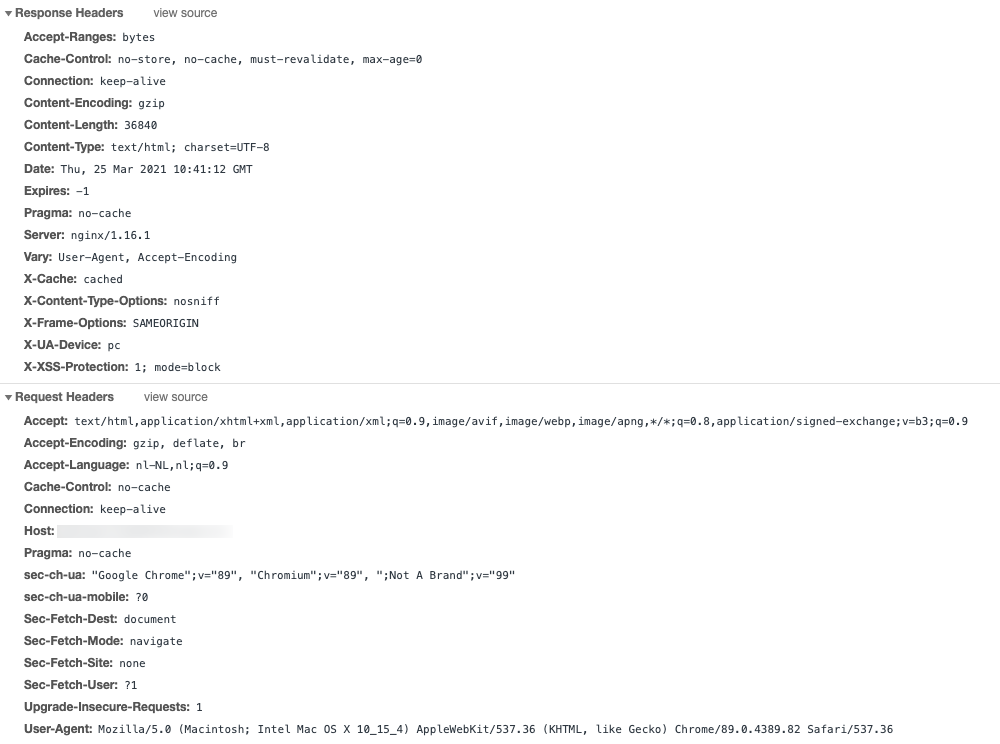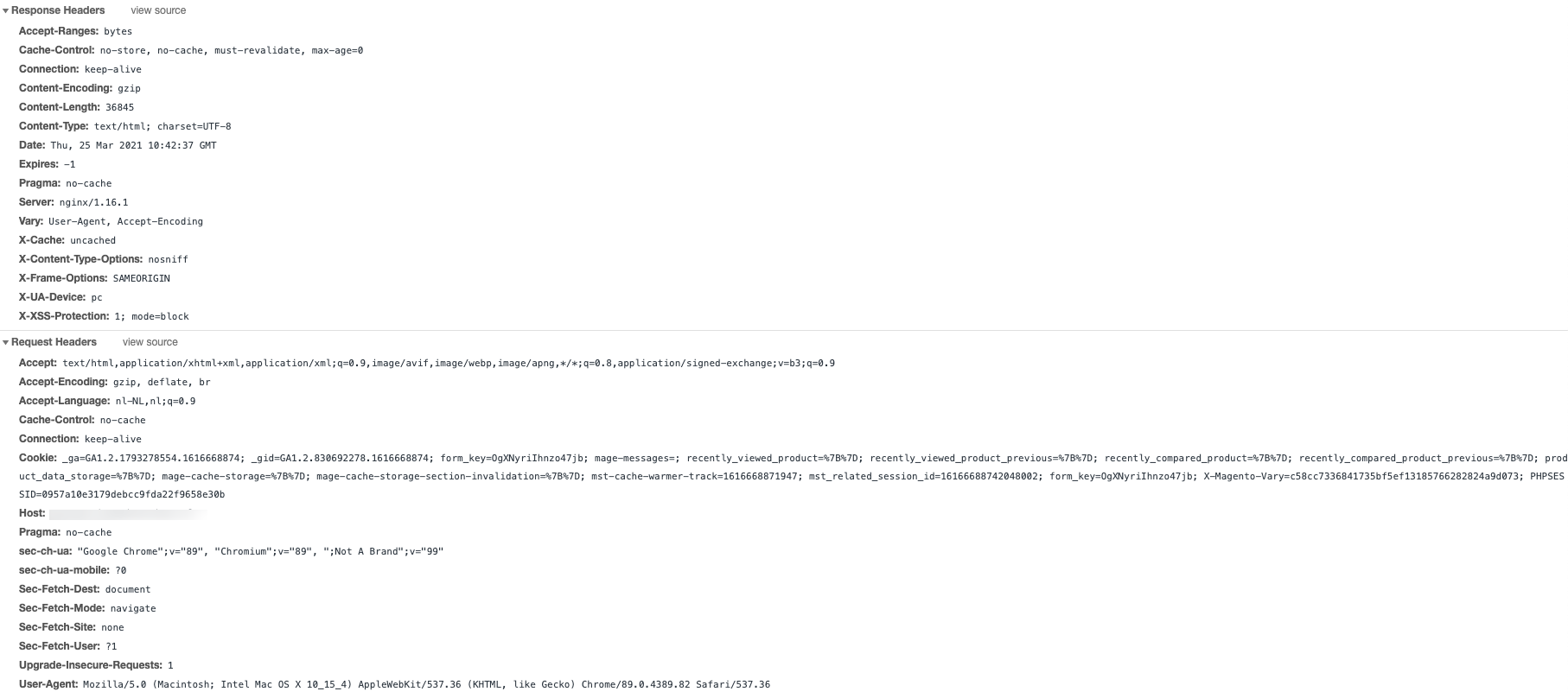My Magento 2 setup with Varnish normalises user agents to pc/mobile/bot. It is configured to store different cached versions per user agent.
The caching per user agent works great, but it seems to be caching a separate version for users with/without recent history as well. I'm assuming this has something to do with cookies being set, but I really have no idea how to tackle the issue. Is anyone familiar with this issue?
Expected result for page:
- Cached version for mobile
- Cached version for pc
- Cached version for bot
Actual result for page:
- Cached version for mobile new visitors' 1st page visit (tested with incognito mode)
- Cached version for mobile with recent activity (eg. browsing through the site, having previously visited, etc.)
- Cached version for pc new visitors' 1st page visit (tested with incognito mode)
- Cached version for pc recent activity (eg. browsing through the site, having previously visited, etc.)
- Cached version for bot new visitors' 1st page visit (tested with incognito mode)
- Cached version for bot recent activity (eg. browsing through the site, having previously visited, etc.)
UPDATE 1: Here's the VCL file and screenshots of the headers.
# VCL version 5.0 is not supported so it should be 4.0 even though actually used Varnish version is 6
vcl 4.0;
import std;
# The minimal Varnish version is 6.0
# For SSL offloading, pass the following header in your proxy server or load balancer: 'X-Forwarded-Proto: https'
backend default {
.host = "#######";
.port = "8080";
.first_byte_timeout = 600s;
.probe = {
.url = "/pub/health_check.php";
.timeout = 2s;
.interval = 5s;
.window = 10;
.threshold = 5;
}
}
acl purge {
"localhost";
"####";
}
include "devicedetect.vcl";
sub vcl_recv {
call devicedetect;
if (req.restarts > 0) {
set req.hash_always_miss = true;
}
if (req.method == "PURGE") {
if (client.ip !~ purge) {
return (synth(405, "Method not allowed"));
}
# To use the X-Pool header for purging varnish during automated deployments, make sure the X-Pool header
# has been added to the response in your backend server config. This is used, for example, by the
# capistrano-magento2 gem for purging old content from varnish during it's deploy routine.
if (!req.http.X-Magento-Tags-Pattern && !req.http.X-Pool) {
return (synth(400, "X-Magento-Tags-Pattern or X-Pool header required"));
}
if (req.http.X-Magento-Tags-Pattern) {
ban("obj.http.X-Magento-Tags ~ " + req.http.X-Magento-Tags-Pattern);
}
if (req.http.X-Pool) {
ban("obj.http.X-Pool ~ " + req.http.X-Pool);
}
return (synth(200, "Purged"));
}
if (req.method != "GET" &&
req.method != "HEAD" &&
req.method != "PUT" &&
req.method != "POST" &&
req.method != "TRACE" &&
req.method != "OPTIONS" &&
req.method != "DELETE") {
/* Non-RFC2616 or CONNECT which is weird. */
return (pipe);
}
# We only deal with GET and HEAD by default
if (req.method != "GET" && req.method != "HEAD") {
return (pass);
}
# Bypass shopping cart, checkout and search requests
if (req.url ~ "/checkout" || req.url ~ "checkout" || req.url ~ "/onestepcheckout" || req.url ~ "/catalogsearch") {
return (pass);
}
# Bypass health check requests
if (req.url ~ "/pub/health_check.php") {
return (pass);
}
# Set initial grace period usage status
set req.http.grace = "none";
# normalize url in case of leading HTTP scheme and domain
set req.url = regsub(req.url, "^http[s]?://", "");
# collect all cookies
std.collect(req.http.Cookie);
# Compression filter. See https://www.varnish-cache.org/trac/wiki/FAQ/Compression
if (req.http.Accept-Encoding) {
if (req.url ~ "\.(jpg|jpeg|webp|png|gif|gz|tgz|bz2|tbz|mp3|ogg|swf|flv)$") {
# No point in compressing these
unset req.http.Accept-Encoding;
} elsif (req.http.Accept-Encoding ~ "gzip") {
set req.http.Accept-Encoding = "gzip";
} elsif (req.http.Accept-Encoding ~ "deflate" && req.http.user-agent !~ "MSIE") {
set req.http.Accept-Encoding = "deflate";
} else {
# unknown algorithm
unset req.http.Accept-Encoding;
}
}
# Remove all marketing get parameters to minimize the cache objects
if (req.url ~ "(\?|&)(gclid|cx|ie|cof|siteurl|zanpid|origin|fbclid|mc_[a-z]+|utm_[a-z]+|_bta_[a-z]+)=") {
set req.url = regsuball(req.url, "(gclid|cx|ie|cof|siteurl|zanpid|origin|fbclid|mc_[a-z]+|utm_[a-z]+|_bta_[a-z]+)=[-_A-z0-9+()%.]+&?", "");
set req.url = regsub(req.url, "[?|&]+$", "");
}
# Static files caching
if (req.url ~ "^/(pub/)?(media|static)/") {
# Static files should not be cached by default
return (pass);
# But if you use a few locales and don't use CDN you can enable caching static files by commenting previous line (#return (pass);) and uncommenting next 3 lines
#unset req.http.Https;
#unset req.http.X-Forwarded-Proto;
#unset req.http.Cookie;
}
# Authenticated GraphQL requests should not be cached by default
if (req.url ~ "/graphql" && req.http.Authorization ~ "^Bearer") {
return (pass);
}
return (hash);
}
sub vcl_backend_fetch {
if (bereq.http.X-UA-Device) {
set bereq.http.User-Agent = bereq.http.X-UA-Device;
}
}
sub vcl_hash {
if (req.http.cookie ~ "X-Magento-Vary=") {
hash_data(regsub(req.http.cookie, "^.*?X-Magento-Vary=([^;]+);*.*$", "\1"));
}
# For multi site configurations to not cache each other's content
if (req.http.host) {
hash_data(req.http.host);
} else {
hash_data(server.ip);
}
# To make sure http users don't see ssl warning
if (req.http.X-Forwarded-Proto) {
hash_data(req.http.X-Forwarded-Proto);
}
if (req.url ~ "/graphql") {
call process_graphql_headers;
}
}
sub process_graphql_headers {
if (req.http.Store) {
hash_data(req.http.Store);
}
if (req.http.Content-Currency) {
hash_data(req.http.Content-Currency);
}
}
sub vcl_backend_response {
if (bereq.http.X-UA-Device) {
if (!beresp.http.Vary) { # no Vary at all
set beresp.http.Vary = "X-UA-Device";
} elsif (beresp.http.Vary !~ "X-UA-Device") { # add to existing Vary
set beresp.http.Vary = beresp.http.Vary + ", X-UA-Device";
}
}
set beresp.http.X-UA-Device = bereq.http.X-UA-Device;
set beresp.grace = 3d;
if (beresp.http.content-type ~ "text") {
set beresp.do_esi = true;
}
if (bereq.url ~ "\.js$" || beresp.http.content-type ~ "text") {
set beresp.do_gzip = true;
}
if (beresp.http.X-Magento-Debug) {
set beresp.http.X-Magento-Cache-Control = beresp.http.Cache-Control;
}
# cache only successfully responses and 404s
if (beresp.status != 200 && beresp.status != 404) {
set beresp.ttl = 0s;
set beresp.uncacheable = true;
return (deliver);
} elsif (beresp.http.Cache-Control ~ "private") {
set beresp.uncacheable = true;
set beresp.ttl = 86400s;
return (deliver);
}
# validate if we need to cache it and prevent from setting cookie
if (beresp.ttl > 0s && (bereq.method == "GET" || bereq.method == "HEAD")) {
unset beresp.http.set-cookie;
}
# If page is not cacheable then bypass varnish for 2 minutes as Hit-For-Pass
if (beresp.ttl <= 0s ||
beresp.http.Surrogate-control ~ "no-store" ||
(!beresp.http.Surrogate-Control &&
beresp.http.Cache-Control ~ "no-cache|no-store") ||
beresp.http.Vary == "*") {
# Mark as Hit-For-Pass for the next 2 minutes
set beresp.ttl = 120s;
set beresp.uncacheable = true;
}
return (deliver);
}
sub vcl_deliver {
if (obj.hits > 0) {
set resp.http.X-Cache = "cached";
} else {
set resp.http.X-Cache = "uncached";
}
if ((req.http.X-UA-Device) && (resp.http.Vary)) {
set resp.http.Vary = regsub(resp.http.Vary, "X-UA-Device", "User-Agent");
}
if (resp.http.X-Magento-Debug) {
if (resp.http.x-varnish ~ " ") {
set resp.http.X-Magento-Cache-Debug = "HIT";
set resp.http.Grace = req.http.grace;
} else {
set resp.http.X-Magento-Cache-Debug = "MISS";
}
} else {
unset resp.http.Age;
}
# Not letting browser to cache non-static files.
if (resp.http.Cache-Control !~ "private" && req.url !~ "^/(pub/)?(media|static)/") {
set resp.http.Pragma = "no-cache";
set resp.http.Expires = "-1";
set resp.http.Cache-Control = "no-store, no-cache, must-revalidate, max-age=0";
}
unset resp.http.X-Magento-Debug;
unset resp.http.X-Magento-Tags;
unset resp.http.X-Powered-By;
unset resp.http.Server;
unset resp.http.X-Varnish;
unset resp.http.Via;
unset resp.http.Link;
}
sub vcl_hit {
if (obj.ttl >= 0s) {
# Hit within TTL period
return (deliver);
}
if (std.healthy(req.backend_hint)) {
if (obj.ttl + 300s > 0s) {
# Hit after TTL expiration, but within grace period
set req.http.grace = "normal (healthy server)";
return (deliver);
} else {
# Hit after TTL and grace expiration
return (restart);
}
} else {
# server is not healthy, retrieve from cache
set req.http.grace = "unlimited (unhealthy server)";
return (deliver);
}
}
Headers of a 1st visit (with cache hit)

Headers of a visit with recent browse activity on site (with cache hit)


Varyheaders.